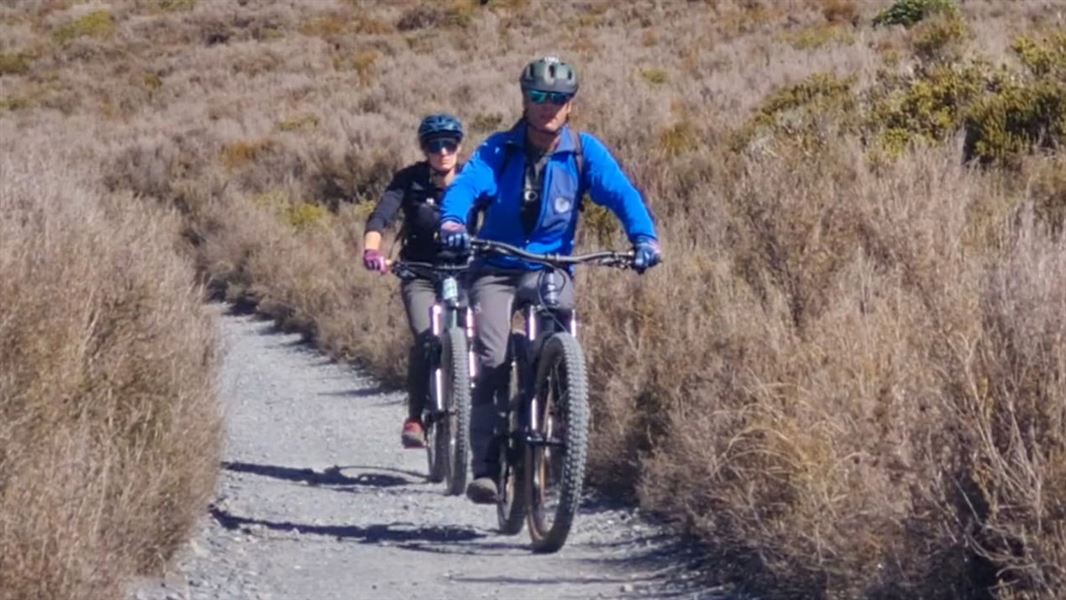Archived content: This media release was accurate on the date of publication.
Date: 10 January 2024
Video footage obtained by DOC shows trampers on the Crossing watching on in bemusement as the two cyclists wind their way through the sacred landscape of the Dual World Heritage Tongariro National Park.
DOC Tongariro Operations Manager George Taylor says to get to the point where they were filmed, the rule-breaking mountain bikers had to pass signs warning mountain biking was not permitted, traverse hundreds of steps, go past numerous walkers – and not encounter a single other cyclist.
It is an offence under the Tongariro National Park bylaws (1981) to use a vehicle, including bicycles, off formed roads.
“Mountain biking is clearly not a permitted activity – it’s an affront to those working to protect the fragile environment and cultural significance of the Tongariro Alpine Crossing to see people deliberately disregard the rules and clear communication of those.
“Bicycles on walking tracks can damage sensitive alpine environments, present a safety risk to trampers, and are generally disrespectful of this taonga national park,” says George.
“Our compliance officer said the pair were a little defensive to begin with but cooperated politely with his requests.”
Ngāti Hikairo ki Tongariro and DOC want to ensure the experience of the Tongariro Alpine Crossing is safe, respectful, and sustainable into the future.
Ngāti Hikairo ki Tongariro spokesperson Te Ngaehe Wanikau says Ngāti Hikairo ki Tongariro were deeply concerned to hear mountain bikes had been used to traverse the Tongariro Crossing.
“As the Kaitiaki – guardians and hapū who maintain Mana Whenua in this area - our inherent responsibility requires we ensure the spiritual, cultural and physical safety and well-being of our sacred maunga Tongariro, and that of all people who share the magnificence of Tongariro with us.
“The Tongariro Alpine Crossing is a place where people connect in a physical and in many instances, a spiritual manner with this special environment.
“The use of mountain bikes on a track created solely for pedestrian use, places both the users of the crossing, and the unique environment of Tongariro at risk.
“Ngati Hikairo ki Tongariro condemns mountain biking and any other non-pedestrian activity compromising the safety and well-being of people and Tongariro.”
DOC has recently introduced a booking system for visitors to the Tongariro Alpine Crossing, a first step in sustainable management for the popular site.
If the tourists had booked their trip, they would have received confirmation emails containing safety and cultural information to perhaps avoid their embarrassing mistake.
“Aotearoa New Zealand is precious, and everyone who lives and travels here has a responsibility to look after it and respect its nature, people, and culture,” says George.
“In addition, each of us needs to take personal responsibility by preparing for the location, conditions, and, of course, whether the chosen activity is allowed!
“We encourage people to prepare for their trips, protect nature, and enjoy the taonga that is Tongariro National Park.”
DOC urges all visitors planning recreation on public conservation land – particularly national parks – to visit the DOC website and properly inform themselves about the activities which are allowed at their destination.
Background information
Tongariro National Park has Dual World Heritage status for its cultural and natural heritage values. One of only three World Heritage sites in Aotearoa New Zealand, it was the first in the world to be given Dual World Heritage status.
DOC will be implementing a range of changes to the Tongariro Alpine Crossing in the coming years, aiming to better manage the pressures and strengthening cultural and heritage values in the area.
DOC has introduced a free booking system for users of the Tongariro Alpine Crossing. This system provides safety and cultural information directly to visitors, and data will be used to inform future management options.
Contact
For media enquiries contact:
Email: media@doc.govt.nz
